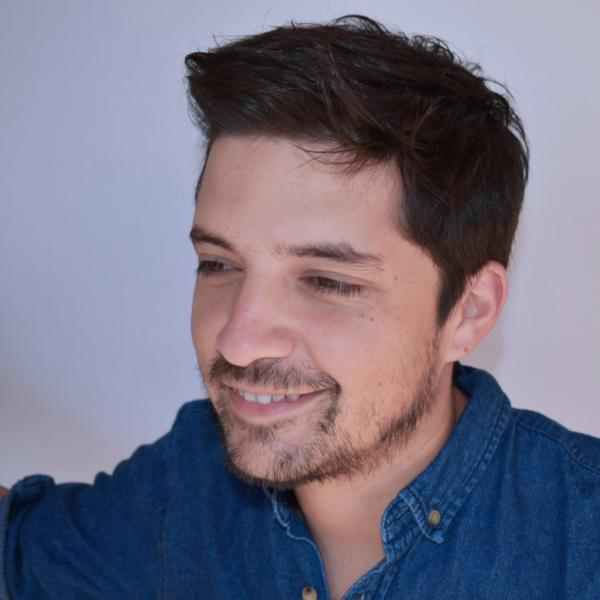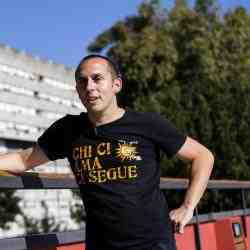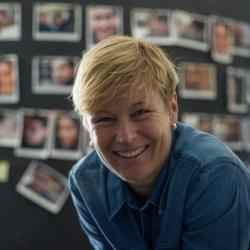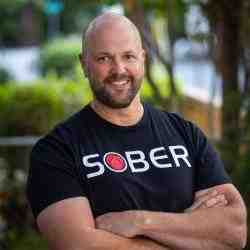Introduction
Víctor’s vision is to leverage sports as a therapeutic tool to prevent mental health issues and foster community cohesion, particularly among underprivileged children and youth. His foundation Fútbol Más turns sports fields into spaces for psychological and social development, addressing issues such as resilience, school dropout rates, impulse control, and gender equity. His patented academic approach transforms the person from within and delivers measurable long-term indicators targeting the root of these problems by involving entire communities—children, parents, teachers, and neighborhood leaders.
The New Idea
At the heart of Víctor’s work, Fútbol Más (FM) is the innovative use of sport as a medium for psychological and social intervention. Víctor’s experience of working in poor neighborhoods has shown him how children are trapped in a vicious cycle of violence, worsened by their lack of emotional and psychological coping skills and in an environment where crime, dysfunctional behaviour and addiction are commonplace. Families and schoolteachers are ill-equipped to support the development of children in this adverse environment. As a psychologist and expert in behavioral psychology, Víctor understood that these communities, who will never have access to therapy, needed to develop skills that could ultimately change their expected behaviors due to their surroundings. To be effective and sustainable, this would require a comprehensive approach that involved the child’s immediate environment. Víctor chose football, a world-famous sport that provided the structure at the source of his innovative methodology. Football as a reference point, with its rules and regulations, works because all three target groups – families, teachers and children – can relate to it.
FM uses the same tests as traditional psychology and produces measurable impact data over time on issues that are generally difficult to track, such as cohesion, and thus the foundations on which stakeholders in aid organizations can base their decisions. Their patented methodology uses tools such as the Green and Blue Cards (based on the color cards used in football to communicate with players and manage the game) to promote positive behaviour and community engagement through self-awareness, conflict management, sense of belonging, and integration. Children, parents, and teachers use these cards, which symbolize meritocracy and behavioral change, to reward their overall initiative and positive actions rather than their sporting prowess. It is clear to the children that they are “attending Fútbol Más,” not just “playing football.”
By focusing on mental health, resilience, and community cohesion, FM creates a win-win situation for all involved – children enjoy a supportive environment, parents and teachers see positive changes, and communities become more united and engaged. FM’s programs are designed to be inclusive and adaptable to different contexts, ensuring that both boys and girls can safely participate. The organization’s methodology is constantly replicated through training programs for teachers, neighborhood leaders, and caregivers, ensuring that the principles of positive psychology and community engagement are embedded in local practice. FM’s initiatives are also being adopted in refugee camps and conflict zones, demonstrating their adaptability and relevance in different contexts. To date, FM has extended its reach to 250,000 children in 11 countries, supported by a global network of organizations, including UNICEF, UNHRC, and the UEFA Foundation. Today, Víctor’s approach is to reach an even more massive spread thanks to the digitalization of the kits for trainers and to broaden his strategic partnerships built on years of trust. By focusing on training the trainers and creating a network of certified schools, Víctor aims to sustain the foundation’s impact over time. As FM continues to build alliances and advocate for its methodology internationally, it is well-positioned to create lasting social change and improve mental health outcomes for children in conflict zones.
The Problem
Chile exhibits alarming rates of both malnutrition and sedentary lifestyles, with 30% of children affected by obesity. Additionally, Chile has the highest rates of child depression among OECD countries, comparable to post-war societies. The closure of educational establishments during the pandemic has further exacerbated these issues, leading to increased social isolation, stress, anxiety, and concentration problems among children, with nearly 51,000 dropouts reported in 2022. Municipal pitches, which could serve as spaces for physical activity, often become centers for drug abuse and insecurity during empty afternoon hours.
Chile’s education system has also been criticized for failing to address the mental health needs of students. This context is exacerbated by a wider societal ‘fragmentation crisis’ in which social support networks have diminished and trust among citizens is low. According to a study by the Catholic University, a third of the Chilean population has only one person, or no one at all, to talk to about critical issues, and only 19 percent of the population trusts strangers.
In this environment, innovative approaches to education are crucial. Traditional teaching methods worldwide have not kept pace with the changing cognitive needs of children in the digital age. Physical education (PE) classes are often not linked to academic learning or self-awareness, missing the opportunity to integrate movement with cognitive and emotional development.
Scenarios where one or more risk factors are present are multiplying, and it is more necessary than ever to implement long-term strategies that create environments where protective factors predominate. Young people’s mental well-being has a direct impact on their cognitive and physical development and is a key factor in healthy communities.
After having detected these problems in his home country, Víctor learned that in other countries where he was introducing Fútbol Más, not only are all the above factors similar, but especially in conflict zones with refugee camps, unaccompanied children are exposed to elevated levels of trauma and have virtually no possibility to access psychological treatment. According to UNHCR, 6.6 million people live in refugee camps worldwide, 22% of all refugees, and COVID restrictions have turned many camps into indefinite homes, with the lowest resettlement numbers recorded in almost two decades in 2023.
Adding to this, many vulnerable neighborhoods today are in the hands of gangs that claim ownership of places like the communal pitch, and parents are reluctant to expose their children to their peers, so school pitches are acquiring increasing importance as safe spaces.
Finally, stakeholders need reliable data to change laws and policies, whether at ministerial, community or national/international NGO level. Abstract concepts such as community cohesion, trusting strangers, and believing in oneself can only be measured over time, using comparable indicators and large focus groups, as scientific psychology provides.
The Strategy
Fútbol Más (FM) is a social accompaniment program that focuses on preventing future mental health problems and psychosocial support as the cornerstone of its intervention techniques. Through these methods, Víctor and his team tackle the root causes of the violence and drug abuse that threaten the lives of children and families in vulnerable contexts. The cycle of violence in such environments is only a symptom of an accumulation of unarticulated negative emotions, and so FM’s interventions are designed to promote change at a psychosocial as well as a physical level.
FM’s trained staff usually implement their methodology in the heart of neighborhoods, using local sports facilities. The method starts with children and gradually extends to adults, who get to know their neighbors, build trust, and see their children change. These ‘socio-sports’ workshops take place on the pitch in 1.5-hour sessions, building teamwork and community cohesion around the sport. While the children are having fun, potential community leaders are being trained to become role models for the children. Through the Neighborhood Coordination and Family Football Committees, adults are encouraged to participate actively in the community. An engaged and committed community creates safe public spaces for children’s development.
In schools, FM promotes the development of children’s socio-emotional skills and strengthens their school environment through play and sports. Teachers are trained to use the Fútbol Más methodology in their daily work. Meanwhile, parents are encouraged to take part in the activities in order to strengthen their commitment to their school. With socio-sport sessions as the main tool for creating spaces for participation, this program focuses on promoting the integration of children and young people into their communities through artistic, cultural, educational and integration activities. Training for caregivers provides opportunities for reflection and self-care, which helps to facilitate sport for development.
The core element is the Green Card, a green piece of paper that acts as a pedagogical tool for bonding, positive reinforcement, and clear boundaries, promoting learning through play and ensuring a formative approach to football. It does not exclude, punish or admonish but rewards and encourages positive pro-social behavior in children, young people, and adults. The children earn points on the card, which gives them access to participate in local matches. Since this principle works well, the Green Card is also widely used at international football matches to promote peace in stadiums at professional matches. The Blue Card, on the other hand, invites young people to change behavior such as fouls, bullying, or anti-social attitudes, both individually and as a group. It acts as a catalyst and invites people to commit to changing behavior. It responds to a philosophy of meritocracy that fosters learning from mistakes through understanding, companionship and reflection. Every 8 weeks, Víctor’s teams organize private sessions with the Blue Card, where the child generates a reflection on his or her own behavior. The rules of the cards (what is OK, what is not) are adapted to the intercultural context. They can address issues such as reducing school drop-out, increasing participation in neighborhood meetings, strengthening impulse control, etc.
Some of the other tools used are the anti-bullying kit El Partido de mi Escuela (My School’s Game), which consists of guiding questions to encourage children to reflect on issues such as self-esteem and motivation at school, gender equality, healthy lifestyles, and participation and citizenship training; El Partido de mi Barrio (My Neighborhood’s Game), a board game with chips on which the stations represent community spaces. Parents who take part in the game place traffic lights in the stations to indicate the points that need to be changed. This is an opportunity to talk to their children about non-violent conflict resolution. Another program, Camarín Educativo (Educational Changing Room), uses the intimate space before and after sports to talk with teachers about more personal matters.
While football has proved to be an excellent framework for Víctor’s interventions, a key aim is to counter the competitive culture that prevails in sport, and so Víctor uses this premise to innovate. Matches are divided into four quarters (instead of two), and the teacher/neighborhood leader cannot exclude or substitute a child (which is a common practice when the coach thinks the team is underperforming), so the championship is not won by the one who is best with the ball, but by the one who is best at overall teamwork. The ball can also be a baseball, to attract countries like Venezuela where football is not as popular, or no ball at all, in cultural contexts like the Arab world where girls are not allowed to play with it, and where FM has invented games that recreate the emotions of football. FM invites and treats girls and boys equally.
While Victor perfected his methodology, including the green and blue cards system in Chile, he aims to use FM’s 100% owned and operated model to move toward more open sourcing globally. For example, he has received international financing from UNICEF to expand internationally as FM and reached 11 countries with staff, financing, and significant impact (FM has reached 250,000 people with proven results). The next step is to make his playbook and operations approach available to many groups worldwide who will learn his approach while helping them get their own financing and making local adaptations.
Social sport is becoming an increasingly valuable tool in the global context of natural disasters and humanitarian crises. Fútbol Más teams create tailor-made programs for vulnerable neighborhoods, schools, nursing homes, border camps and shelters for people on the move. When disasters strike, Fútbol Más activates its emergency protocols. With an estimated 65 million refugees in the world, this is more urgent than ever. Hand in hand with humanitarian aid programs, they seek to support and restore happiness to children and young people affected by war, floods, fires, earthquakes or typhoons. Through socio-sports workshops and community activities, FM provides emotional support for children and communities in times of post-traumatic stress (so far in Chile, Ecuador, Mexico and Mozambique). In refugee camps, FM seeks to restore the rights of children and young people affected by various humanitarian crises and mass migration processes. In migrant-majority neighborhoods, they promote inclusion in communities, shelters and schools through social sports and community festivals. These help to generate dialogue in the public sphere and promote the exchange of culture and traditions. They train paid tutors on an ongoing basis to become ambassadors for the program within their communities, promoting a culture of care and respect for children, young people and their families. Through virtual or face-to-face meetings, e-learning tools and remote support, participants learn how to replicate the concept of resilience applied to sport and the socio-sport methodology implemented by Fútbol Más.
FM’s methodology is based on solid and widely researched concepts in psychology, which allows for a detailed measurement of the impact of risk contexts compared to the safe spaces created by the Foundation on Children’s Mental Health. FM uses psychological tests, scientifically validated in 60 countries to detect mental health problems in the future, and which provides a deeper insight than a single questionnaire. Additionally, FM has its own data analysis laboratory, staffed by two psychologists and two sociologists.
Over the years, impact has been measured in terms of:
- Healthy communities: When surveyed in 2019 about their level of trust in others, 25% of parents/tutors who participated in Fútbol Más said, “a lot,” compared to only 17% of Chileans in general, according to local surveys. They also had 5 close friends, compared to 3 nationally, and the perception that "my neighborhood is a good place to raise children" increased by an average of 10% after the intervention.
- Physical health: In 2020, participating parents/caregivers responded to the question “How often did your child do sports in the past month?” with 49% saying “always,” 43% “sometimes” and only 9% “(almost) never,” compared to pre-intervention rates of 28, 38 and 34% respectively.
- Mental health: Since 2013, the World Health Organisation - Five Well-Being Index (WHO-5) indicator on children’s mental health has been regularly used before and after each FM intervention. While in 2013 the average score of mental wellbeing “after” was 49%, in 2017 it had already risen to 64%. Particularly in state foster care, FM has achieved remarkable results with a 14% increase in overall wellbeing.
With these results in hand, FM aims to influence public policy with many successful examples in different countries. The UNHCR used the methodology designed for migrants in their distinct stages for its Sport for Development policy for 2022-2023. A post-COVID intervention in Venezuelan schools was adopted by the Ministry of Education and became part of the Ministry’s recommendations for all schools nationwide in 2023. The FM program to intervene in public spaces in high-risk neighborhoods in Peru, developed with the Ministry of the Interior, resulted in the training of all coordinators of the Barrio Seguro program at national level and a manual of socio-sport interventions that is part of their guidelines. In Paraguay, in partnership with the Ministry of Education and the National School of Physical Education, the curriculum of the Physical Education course is being modified to include football and sport for development methodologies and to become a training center for teachers at the national level. And, in Ecuador, the design and implementation in the first year of President Lasso’s public policy "Hincha de mi barrio", using FM’s methodology, is now being implemented by the country’s Ministry of Sports.
Through its methodology, FM has been able to generate data on difficult-to-measure aspects, such as quantifiable levels of trust and social cohesion over time. The Foundation now has all the human, technical, and technological tools to implement and replicate its methodology with other institutions or individuals who are already working with children in vulnerable situations. With a global budget of almost 4 million USD in 2023, mainly from companies and international organizations such as UNICEF, UNHRC, IOM, UEFA Foundation, Common Goal, Nivelat, IDB, AGCID Chile, among many others, after 16 years of activity, Fútbol Más today counts on 360 employees who carry out more than 200 socio-sport intervention programs with children per year in 11 countries.
Based on interest shown so far in many locations, Victor is confident that FM can impact one million people in the medium term with his data-driven approach, which measures many elements of his programs and their social and psychological impact. Victor believes that FM and its many new partners can ultimately impact the lives of ten million people. To scale impact, Víctor plans to increase the time he spends on strategy and position FM at the heart of the major international NGOs. After years of modeling his patented academic approach, which transforms the person from within and creates measurable long-term indicators, Víctor’s main concern today is to digitize the method and train multipliers in conflict areas in order to reach even wider groups of children, especially in refugee camps. He is doing this by implementing a digital platform that is easily accessible by mobile phone. Key issues are the training of trainers on the ground in war zones, the creation of a network of certified “Football for Development” schools, an app to involve families, and the reduction of direct intervention versus the reorientation of alliances at the global level, where FM is most needed – in conflict zones.
The Person
Víctor Gutiérrez’s journey into social innovation began early in his life, deeply influenced by his father’s tenacity and his own experiences growing up in Santiago. His father, who rose from poverty to become an important figure in Chile’s largest bank, instilled in him a spirit of perseverance and dedication. Víctor’s passion for football and community service was evident during his school years, when he would travel to Santiago’s slums to play football with underprivileged children. This early exposure to social issues led him to intern with América Solidaria and later to study psychology at university, focusing on community psychology and impact evaluation. In 2007, while still a student, Víctor founded Fútbol Más, a foundation that uses football as a tool for mental health and community resilience. His role as Social Director and methodology designer laid the foundations for the foundation’s innovative approach. Over the years, Víctor has expanded his expertise with additional training in impact evaluation and leadership and has received numerous awards for his contributions to social innovation.
Víctor’s relationship with mental health and community resilience is deeply personal, rooted in his own experiences and observations. Growing up, he witnessed the transformative power of football in the life of his father and in the lives of the children he worked with in the slums of Santiago. This connection to football and its potential to foster resilience and spiritual well-being became the cornerstone of his work. Víctor’s Jesuit education and exposure to liberation theology and popular education in Brazil further shaped his understanding of community empowerment. His work with Fútbol Más is driven by a commitment to the well-being of children, a focus that remains central to his ethics and approach.
The decision to create Fútbol Más was a culmination of Víctor’s first-hand experiences, his education and a pivotal moment of reflection. While studying for his final exams at university, conversations with a mentor, Guillermo, gave him the confidence to take the leap and start the foundation. This ‘aha’ moment was reinforced by his desire to address the mental health challenges he had seen first-hand in vulnerable communities. Víctor’s ability to persuade stakeholders to fund key programs at an early stage demonstrated his determination and vision. Despite facing burnout from the operational demands of his role, Víctor’s passion for the cause remains unwavering. His goal now is to focus on the strategic aspects of the Foundation to ensure its continued impact.
Víctor is proud of the team that joined him in the early days of his idea, and who are still friends today, putting their expertise at the service of Football Más: Rodrigo Abarzúa Molina, current Commercial Director, Juan Eduardo Araya Ariztía, current International Operations Director, and Guillermo Rolando Vicente, current CEO of Fútbol Más. These long-standing relationships of trust and solid expertise have allowed Víctor to focus on continuously innovating and spreading the FM’s methodology worldwide.




